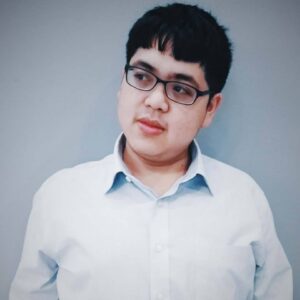
Our virtual resident, editor and poet Crispin Rodrigues has written a beautiful commission on the language slipstream, slipping between different languages and ways of speaking.
Here, Crispin shares a mix of personal reflections and poems, particularly focussing on biracial identity and the way people speak. His reflections span from growing up in the spoken word scene in Singapore, to interacting with fellow virtual residents. Crispin explores topics such as the literary value of Singlish finally being recognised, code switching (alternating between two or more languages in a situation or conversation) as a common practice for biracial people trying to articulate who they are and how we subconsciously adapt our language to appeal to different audiences.
Crispin produced this commission during a 2022 virtual residency with NCW supported by National Arts Council of Singapore.
In the Language Slipstream
The one thing that fascinated me when I first applied for the virtual residency at the National Centre for Writing was the question that the National Arts Council, Singapore, posed to me – Do you want to apply for the virtual writers residency or the virtual translators residency? I had been dabbling in writing poetry primarily in English and was working on a manuscript of the biracial experience so I was really intrigued by the either/or option I was given.
Growing up in a biracial family, I have sometimes acted as a translator between my parents. My mom would say a turn of phrase in Chinese or Cantonese and I would translate it for my dad. Likewise, my dad would say something in English that would fly past my mom and I would repeat the phrase for her in Chinese so that she could understand. It was not that my parents could not speak to each other, but between them language would sometimes get lost in the way they had used it so that I had to step in. This was great for me, because as a poet whose job was to stretch language to its absolute limits, they had done the stretching for me and all I had to do was to apply it in my poetry.
Singaporean poetics has taken a turn to use code switching as the primary mode of communication
As a poet who grew up with the spoken word scene in Singapore I was particularly interested in the way people spoke and their choice of replying/interjecting/answering/deviating using language. In Singapore, code switching between different languages and dialects is such a commonplace thing to do. I was however really interested in code switching as a speech act, especially as a political act. I primarily speak English in workshops that I teach or when I give readings at literary festivals. But in recent years, I have been fascinated in the way that Singaporean poetics has taken a turn to use code switching as the primary mode of communication. While Singlish (the English creole that is present in Singapore) has been used in Singapore writing for decades, its literary value has only been contemplated in the last twenty years or so. Its cadence is nothing like English, emphasising economy, efficiency and musicality, which was perfect for poetry.
During the residency, I took the time to contemplate how much code switching and language hybridity I should use in my poems in order to situate them within the space of understanding, and yet leave sufficient manoeuvrability for me to say what I wanted to say. I had the wonderful opportunity to chat and work with my mentor Will Harris, himself a biracial poet, to consider the biracial body as one that engages with both races in order to make sense of one’s identity. The biracial body is often one that is castigated for not being sufficiently within the identity parameters of either race, and this makes code switching a primary method of demonstrating that slipperiness that biracial writers often have to navigate in order to articulate who they are.
To demonstrate this, here is a poem I wrote during my residency:
风
sounding like 凤 / meaning bird of fire / rainbow bird / rebirthing bird / from the 凤凰 / both masculine & feminine / a chimera / meaning i once was a twin but i ate my other half / doctors call this a statistical anomaly / i call it my shadow / mother calls it an ultrasound error / sounding like 缝 / meaning to weave / meaning sown in my skin is the subject of my poem / dear sister-half i miss you / & if you can hear yourself through me / i want to know i am proud of you / sounding like 封 / meaning sealed / meaning i send a letter to you with my thoughts / in what i have done & in what i’ve failed to do / by speaking to you for once i am addressing us both / meaning 龙凤 / together we care for this body / tempered / meaning i will try my best for the both of us / dear 凤 / with every breath /
In this poem I navigate synonyms of the word 风 (feng), meaning wind, and while it is not necessary to know what the Chinese words are, there is a little loss of meaning in the inability to understand the Chinese. But if you do understand Chinese, then the experience of reading becomes all the more nuanced as it navigates Chinese symbology of gendered mythical creatures. At its fundamental core, the poem looks towards the universality of care, independent of language differences.
Through the course of the virtual residency, I had the opportunity to speak to many writers and translators who had to converse with us over Zoom. We all converse in English, sometimes halting, sometimes the Wi-Fi gives in and we become a mosaic of garbled pixels. Sometimes, I want to reach across the screen and ask my fellow writers to tell me what you want to say, in the way you want to say it. When I speak to an international audience, my tone changes, my syntax changes, my cadence changes. The conversation becomes a speech act of pitching myself at what I think is an appropriate mode of communication. Whether or not this is intentional or unconscious, I am actually not sure. I wonder if it might be the same if I was physically in Norwich engaging in the privacy of one-to-one communication.
But with my family and friends I speak differently. Why do I not do this in other spheres?
The poems are my tongue laid bare.
I worry that this slipping into the slipstream of language is something that I am embarrassed about. This hesitance. This need to be sufficiently English-competent passing.
The manuscript that I worked on represents an extension of the confessional mode, not just because it is based on my actual life, but is also an extension of my speech acts. The poems are my tongue laid bare.
In Singapore, there is an expectation to be effectively bilingual. I’d like to think differently, that like my biracialness, my language runs along a continuum that helps to speak truth to who I am.
mixed race superhero
(after will harris)
‘Last year, more than one in five of all marriages here – or 22.1 per cent – were between people of different races ‘– The Straits Times, 11 July 2018
/ the world shaping in our image / every brown-yellow / not-quite-dark / token-no-more / halal-haram / angular difference / child can now find a role model / their own miles morales / kamala harris / barack obama / keanu reeves /
/ joseph schooling / noeleen hayzer / eunice olsen / benjamin sheares / we were there first / taking the blame for white rapists & dark women / we know the words that can be used on mixed babies / & we turn that kryptonite into good shit / take my brown hands / my child / & let me tell you that / 一代比一代好 / you will eat less salt than me / you will have more to live for / you will have other mixed race babies to mingle / very soon people will think race / a relic /
/ until then / keep kissing / brown lips / yellow lips / white lips / brush your cheeks against luxurious stubble / feel each hair like an unmown blade of grass / meaning you’ll survive this / if you got the booty & the boobs / own it / make love for the pleasure of making love / practise & pray / when you need to / your love pushes against the world / until it finally tears / this dimension / a new one /


Crispin Rodrigues is the author of three collections of poetry, Pantomime, The Nomad Principle, and How Now Blown Crow, as well as co-editor of Crazy Little Pyromaniacs, an anthology of poetry by Singapore poets 35 years-old and below. He has also dabbled in multimedia forms of literary work such as a poetry tour of his hometown of Yishun, Singapore.
For his residency, Crispin worked on his fourth collection of poetry that stems from his mixed-race heritage, and focuses on monstrosity, language hybridity as well as relationship between colonialism and neo-colonialism.
In 2022, the National Centre for Writing offered three virtual residencies for writers from Singapore, generously supported by the National Arts Council of Singapore. The writers were Akshita Nanda, Crispin Rodrigues and Daryl Qilin Yam. Over the six months, the Singaporean writers worked on a project with a UK-based writer as mentor. They also met online with writers and translators connected with Norwich, took part in an interview for The Writing Life podcast and participated in Meet the World events. At the end of the residency, we commissioned a piece from each writer reflecting on their residency and their writing. They also contributed writing tips and a blog for Walking Norwich. Read more here →
You may also like...
Five ways to look at writing differently
Food for thought on how to get yourself writing from Daryl Qilin Yam

15th February 2023
Read about poet Penny Boxall’s residency in Tartu
‘I knew then it was somewhere I’d return to often, even from far away.’

4th January 2023
Photo Letters from Norwich by Shin Jung Keun
A showcase of writing and photography from our most recent Dragon Hall Cottage resident

7th December 2022






